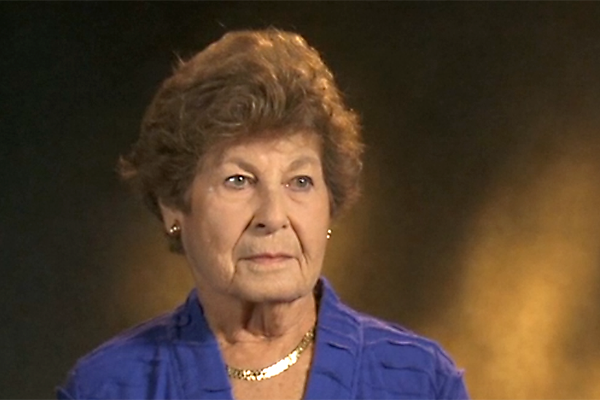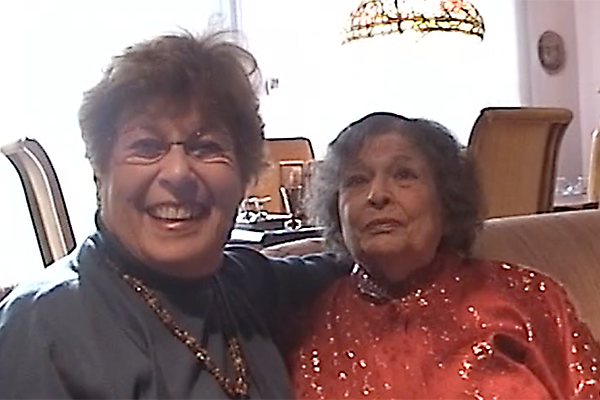 Holocaust Remembrance
Holocaust Remembrance

“I remember that my father was handsome, with dark hair and mustache. He and I sang Yiddish songs together. The most vivid mind- picture I have of my father is in a shul, holding a torah.
“My mother was pretty in a quiet way, her hair always brushed back into a knot. One of my few and fondest memories of my mother was sitting with her in a chair by a window at the end of Shabbat searching for stars.
“She told me that there was a moment, just before Shabbat was over, that if I looked at the sky very closely, I could see God and the angels sitting on his heavenly throne. She said this only lasted for a moment and it was very easy to miss.
“When she put me to sleep, she wetted her fingertips with her lips and rubbed them over my eyelids so that they would feel heavy.”
Herta attended a Jewish girl’s school. In 1940, her teacher, Gertrude Winter, gave a collection of school documents to a non-Jewish woman for safekeeping. Gertrude was deported to Auschwitz, where she was murdered in 1944.
The documents wound up in Israel and were sold to the US Holocaust Memorial Museum in 2016. Herta’s name was on some of the drawings, as well as a photograph of her holding up the two tablets. The Museum curators tracked her down and showed her the drawings, 79 years after and an ocean away from where she drew them. Her pictures were sent out on greeting cards as part of the worldwide Museum’s 2017 membership campaign.
Also in the documents were photos of her classmates; of one photo of 32 students, it was initially thought that none survived. But after reading a mailing from that membership campaign, a woman in Hartford CT recognized herself in the class photo. She’s meeting Herta at the Holocaust Museum today. That’s why she couldn’t be here.
I’m bouncing around in time. Back to 1938. Again, Herta’s words:
“The first time I felt the fear of the Nazi presence was at a parade. Light posts and buildings were heavily draped with the red, white and black Swastika banners and flags. I had never seen such a large crowd. Loud music blared. The people roared approval to the German raised arm salute. I couldn’t see because of the tall people in front of me. The pounding on the street by the German soldiers with their heavy boots felt as if the pavement would crack. I kept looking at my mother. Her face twisted into such fear. She hid my braids under a hat to make me look like a boy. The way she held on to me made my arms hurt. When I asked her what it was all about, she said “It’s bad - it’s very bad”.
“My father and mother owned a small grocery store. When my father became ill my mother had to manage the store alone.
“Soon laws were passed which removed the civil rights of Jewish citizens. Jews lost … jobs in schools, banks and hospitals. They could not use the post office, nor could they appeal to the police for help. Jewish storekeepers were boycotted. People would come into our store, take whatever they wanted, and leave without paying. Kristallnacht occurred on November 11, 1938. This may have been the reason that it became impossible for my mother to keep the store open.
“Soon thereafter the Jewish men in our neighborhood, including my father, were rounded up at dawn and were taken away on trucks to do “forced labor”. They returned …at night, and this happened day after day. I remember whisperings about men who didn’t come home, and of some families who instead of (greeting their fathers at the end of these days) received boxes of ashes from the Germans.
“One morning my mother ran desperately after a truck, screaming after my father in an attempt to hand him some pills that he needed. She was not successful. Then one night, my father came home feeling especially ill. … during that night, he died. He was 51.
“One night we were suddenly awakened by the sound of boots coming down the hall towards our apartment. We heard doors banging and loud voices. We were horrified as three uniformed officers kicked the door open, holding their rifles in front of them. They began to search the furniture and tore open our closets and drawers, throwing things about. We cowed in a corner holding each other … as they yelled at us.
“Finally they left… When it became quiet, my mother and Tante Lotte (my aunt) opened a little drawer in the wood-burning stove … that collected the ashes. They held up money they had hidden there. Still shaking with fright …we hugged each other … grateful that it had not been discovered.
“Soon after that, my mother told me that I was going to “America”. She said it was very far away, where there was no fear of Nazis. I would be safe.
“She explained to me that grown-ups couldn’t leave Vienna, but that (some) children had the opportunity to go to other countries. She would try to … meet me in America. As she tried to comfort me, she said that I would be well taken care of by another “Jewish mother”. There was desperation in her voice …and I think I understood the severity of the plan.
“One night in mid-November, 1940 I was packed up to leave. My school bag… was on my back. My … suitcase … seemed almost as large as I was and it was hard for me to lift. Among my clothes my mother packed …my small doll wearing the red dress and underclothes that she made for her. She included a "Trauer Album", which contained my father's picture, directions to his grave, and yahrzeit dates. Several prayer books and photographs were tucked in, as was the blue paper notebook containing the words to the Yiddish songs my father and I used to sing. On one page she wrote the Ten Commandments, so that I wouldn’t forget …. She had made a warm coat for me from the cloth of my father's old gray overcoat.
“My mother and I joined a group of about fifty children and their parents at the train station. …It was dark and there was a great deal of commotion. Angry words were exchanged between parents and uniformed authorities. Finally, out of many children there, only nine of us were allowed to board the train. … I was the youngest, at seven and a half. I don’t know what happened to those who were left behind, and I will never know why I was one of those chosen.”
So back to my voice. The nine children travelled through Europe for several weeks. On December 23, 1940 they boarded a ship in Lisbon that brought them to their new lives in America.
After being taken in by her first foster family, Herta received a few letters from her mother Beila. But soon the letters stopped, and from that point nobody knew what happened to her.
It wasn’t until 2004, that my brother discovered Beila’s record in the Yad Vashem Names Database. It revealed that Beila was deported to a death camp called Maly Troskinek about 800 miles from Vienna, nearly two years after she last saw Herta. Nobody knows where she was during that time. All we know is that she was killed four days after she arrived at, on November 18, 1942. She was 46.
Although we didn’t have that record, the German government had sent Herta a reparations check for the death of her mother. The amount is $172.81. She signed it over to the Associated Jewish Charities.
In 1975, Herta and my father Arthur went to London to meet a cousin of Beila’s who had searched for Herta for 30 years. From a trunk she gave Herta some heirlooms that Beila had sent to her to give to Herta. Among them was a beautiful unfinished embroidered tablecloth that covered the Torah table during my three sons’ bar mitzvahs.
Herta’s life in America has been the opposite of what Hitler intended. She lived, she fell in love with Arthur Baitch, and on her eighteenth birthday, when her AJC foster care sponsorship ended, he slipped an engagement ring onto her finger under a dinner table. They are both alive and well today, and they recently had a second great granddaughter.
Today she speaks to groups frequently, and we’re all so proud of her. Many of those who lived through the Shoah find it too painful to even think about, let alone talk about. As John Lennon said, “living is easy with eyes closed”. But by opening your eyes and looking into the darkness every so often, it makes you appreciate the light that much more.
I think of my great grandparents often. I wish I could hear them laugh. I wonder how a person could ever love their child enough to let them go.
I think I have a common wish. If we could all speak to those lost in the Shoah in their final, darkest moment, we would want them to know that their story doesn’t end here. Their families will go on, and we will all remember them forever.
What my mother will say to you is that your story didn’t begin here. We are all strangers in a strange land. My family and yours are only here today due to the kindness of strangers, and today we are all extremely lucky.
Click here to view a summary and documents compiled by her son Daniel Baitch
The scroll segment above is best viewed as a full screen video clip. Click on the "full screen icon" in the lower right corner of the video control strip. Use the video start and pause controlls to read the scroll at your own pace.
![]()
![]()
Return to the webpage by clicking on the "close full screen" icon" in the lower right corner of the video control strip

Click on picture above to view Herta's oral history interview at the U.S. Holocaust Memorial Museum

Click on picture above to view the Reunion of Herta Baitch and Stella Bruckenstein Bengel